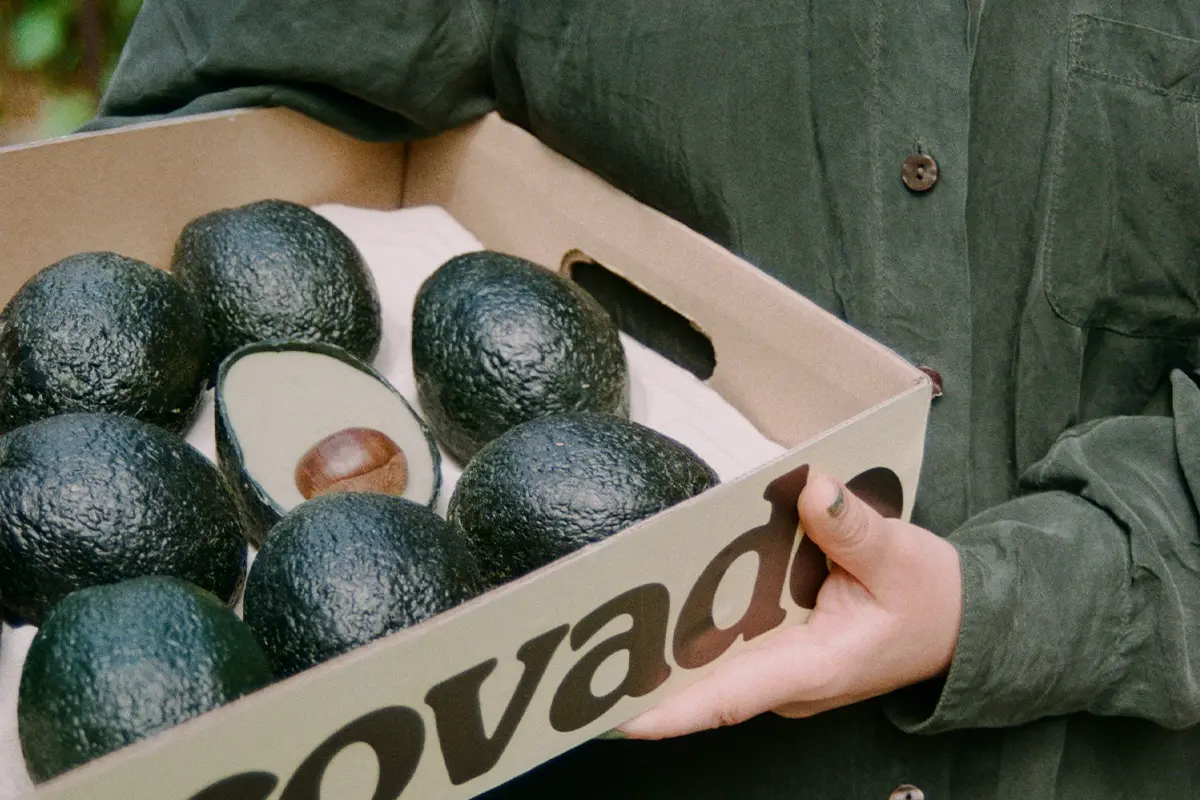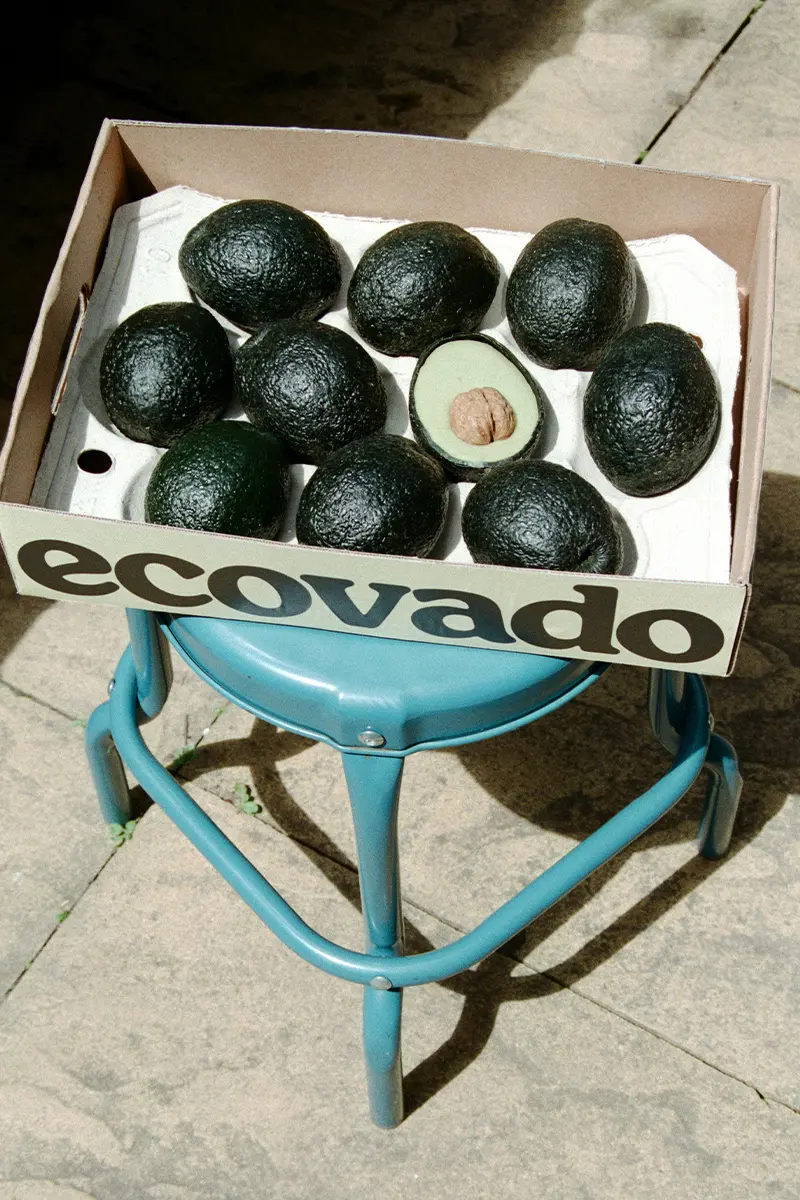Central Saint-Martins graduate, Arina Shokouhi, invents an alternative the avocados with the goal to steer people towards a more sustainable option: enter the Ecovado
An intro to the avocado
When society develops an obsessive habit towards a certain product, it results in a phenomenon known as over-consumption. Raw resources and materials start getting depleted at alarming rates. All this to satisfy the overwhelming demand.
One of the best examples for this is the avocado. Its production is energy and resource intensive; each avocado requires about 320 liters of water to harvest. It is carbon-heavy, a consequence to how involved it is in the export and import industry.
In the US in 2020, about 1091 thousand metric tons of avocados were imported in the country. This is expected to increase to 1571 by 2028. It may be that we find alternative and more sustainable ways to cultivate this fruit. Arina Shokouhi, however, has found a much more direct approach to correcting such a major issue.
Ecovado
She is the inventor of the Ecovado, an alternative to the avocado which contains a light green and creamy body within a faux avocado skin made from bees wax. «It used to be more local and more sustainable,» said Shokouhi, talking about the avocado. As this foodstuff became more popular, it slowly developed into a modern-day icon within influencer communities. Even now, it is used in many different recipes, more notably, the avocado on toast.
The problems with the traditional avocado
This increase in popularity, however, has had some drastic effects on agriculture especially in central and northern South America, where it is predominantly grown. It encourages monoculture, the practice of growing one crop in a field at one time. The main issue with this is the level of intensity it involves. It creates an imbalance in the soil, robbing it of crucial nutrients. This in turn leads to a decrease in its fertility. In the long-run, these fields will slowly yield less and less until they are left completely abandoned.
To counteract this, Shokouhi proposes a similar product to avocado. It looks, tastes and smells the same. It started out as a project to open up the conversation regarding food alternatives. After collaborating with some experts and food scientists, however, they found that they could realistically replicate the avocado using completely different ingredients.
What goes into producing the Ecovado?
It is a researched mixture of broad beans, apple, hazelnuts and cold-pressed rapeseed oil. «The replicated texture is quite similar to the avocado thanks to the broad bean», she explained. This ingredient also provides the final product to have a green tint, like the pulp of an avocado. All these ingredients mixed together replicate just about everything the avocado has; the color, the texture, taste and even smell.
This is all thanks to the collaborations with food scientists and researching molecular compositions. «These collaborations are crucial. I wouldn’t be able to do it without them,» Shokouhi explained. She goes on to explain that molecular studies are actually what revealed apples as an ingredient to use. «I would never have thought to use apple. It’s only a couple of drops but it really gives that freshness».
Finding alternatives within the food industry
It is also what helps to avoid a big obstacle which currently resides in the food industry, more specifically, in finding alternatives within the food industry. Whilst vegan options have grown in popularity and show that we may be heading in the right direction, further research shows we may be cutting some corners.
«I have meat alternatives from time to time but it really puts me off when I turn over the packet and I read the ingredients. It’s completely lab made,» Shokouhi said. Whilst finding alternatives to meat may help to combat climate change within the farming sector, it may act as solving one problem whilst creating a completely new one.
A part from the fact that the ingredients used could be harmful to the human body, the production process of chemical additives isn’t exactly a sustainable solution. This is where molecular studies come in; to replicate taste, texture and smell in the most natural way using local ingredients.
Replacing the cultivation issues of the avocado, not the avocado itself
From a societal point of view, continuously finding new solutions and trying to get people to adapt to them is yet another obstacle. It leads people into thinking in more extreme ways. For example, guilt may play a factor if someone decides to get a plastic bag at the supermarket.
Does the Ecovado mean we can no longer purchase a normal avocado? «It isn’t to discourage people and telling them that what they’re doing isn’t enough,» said Shokouhi. «It’s about knowing where our food comes from and its consequences.» This leads to an open discussion surrounding the concept of seasons in agriculture. Strawberries and asparagus can be found year-round at supermarkets, a phenomena which shouldn’t be considered as natural.
It solely reinforces the fact that more discussions need to be had on where our food comes from and what farming practices surround them. The end goal for the Ecovado is to simply create an alternative, not to erratically replace the avocado. «We are human and we are very creative. We can come up with different solutions that can still be tasty and healthy. We don’t have to stick to one thing, get obsessed with it, and over consume it.»
Local ingredients only – broad beans vs edamame beans
Shokouhi’s focal point in the entire project was to keep the ingredients local to the area. She currently resides in the UK, a country where broad beans, apples and hazelnuts are locally accessible. «This Ecovado doesn’t make sense in Japan for example. It isn’t local to them so it isn’t a solution there», she pointed out.
Promoting local farmers is clearly more sustainable, but so is reducing the carbon footprint when it comes to the import-export industry. Avocados are huge in this sector. Ecovados on the other hand would completely avoid this type of worldwide shipping. Each one would have an original recipe based on which country it is found. Whilst broad beans are locally accessible in the UK, they are not in countries like Japan.
«Maybe edamame beans are more local to Japan, so they would work better», said Shokouhi. One thing that would remain constant, however, is the expiration date of the final product. «I could just add food additives and it could stay one month out of the fridge. But I want it to be like a normal vegetable or fruit that you have to have it fresh,» she explained, stating that the Ecovado can stay in the fridge for about five days before it starts to go bad.
Ecovado – what the future holds
The entire project is still under heavy testing. Shokouhi explained that she is currently concentrating on making the taste even better. Once sorted, she revealed that it could go into mass production if standardizations are passed and meet foodstuff regulations.
The entire avocado shape would require a lot more research and scientific measurement to make sure the final product would remain intact before going into mass production. However, to sell a simple dip such as guacamole, Shokouhi revealed that it is just about ready to go into production. «Even if it doesn’t become available in the market, people can still try it at home. I even see restaurants starting to use mashed peas instead of avocados. The point is that the avocado is unsustainable. That doesn’t mean that no one should ever have avocado. It’s about lowering the consumption, thinking about it more, having more local food. Always get involved and actively do something».
About how we can easily fall into this trap with another item that we start to over-consume
With many current ‘solutions’ in today’s society, it can easily fall into this trap being yet another item that we start to over-consume. The eventual rise in popularity of the avocado was thanks to its healthy nature and dynamic properties. Yet its consumption was also encouraged as a replacement for meat-stuff, an industry which plays a big factor in climate change.
Now, the avocado is contributing to the same issue it was trying to avoid, albeit having a lesser impact. The Ecovado can easily fall into the same trap. However, it creates much less harm than the cultivation of the avocado. This may be the only solution regarding the cycle of consumption patterns we have developed as a society; to simply continue innovating products which gradually impact the environment less and less.
The Ecovado
A sustainable alternative to avocado created using British crops and ingredients. It was invented by Arina Shokouhi, a multidisciplinary designer and researcher including food, textile and art direction.




















